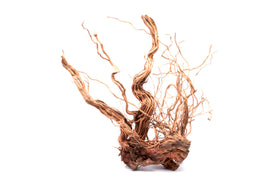
Bucephalandra Brownie Athena
Common Name: Bucephalandra Brownie Athena
Bucephalandra Brownie Athena features oval-shaped leaves with textured edges and rich brown coloration. It's compact size and unique leaf structure make it an excellent, beginner-friendly addition to any aquascape. This plant can grow both submerged and emersed. It's highly prized for its pronounced iridescent coloration with appropriate care when placed under aquarium LED lighting. Bucephalandra variants are slow-growing, with new leaves sprouting from long, thin rhizomes.
As an epiphytic plant, Bucephalandra generates new growth from its rhizome. Optimal results are achieved for Bucephalandra in low to medium lighting conditions, fostering dense growth when provided with favorable circumstances. CO2 injection, adequate water flow, and consistent tank upkeep can encourage faster and more robust growth. When planting, don't cover the stem and rhizome to prevent plant decay and deterioration. While its care is the same as other popular aquatic species like Anubias and Java Ferns, Bucephalandra is less tolerant of abrupt parameter changes.
Key Features & Important Notes
- Bucephalandra is an epiphytic aquarium plant so it can be attached to aquarium hardscape.
- Do not plant Bucephalandra in substrate and cover the rhizome. This will cause it to melt and rot.
- Bucephalandra’s final size, coloration and growth rate are dependent upon the condition of the aquarium Photos are a representation of what you will receive and may vary.
- Do not make drastic changes to the aquarium. Unstable parameters will result in melt and rotting of the aquarium plant.
- CO2 injection will yield better growth. Please research appropriately to ensure your plant thrives.
Care & Additional Information
Listed information should be treated as general guidelines only. We encourage you to do thorough research before committing to keeping any type of livestock.
Family Name: Araceae
Origin: Borneo
pH: 6-8
Skill Level: Easy
Light: Low to Medium
Co2: Not necessary but recommended
Propagation: Cut by rhizome
Growth rate: Slow











